

How Much Do You Know about Quantifiers? For VOA Learning English, this is Everyday Grammar.
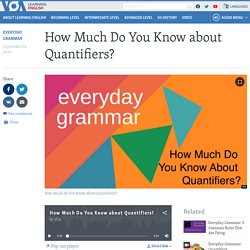
Today we are going to talk about different ways of expressing quantity in English. A quantifier is a word or number that shows an amount or number. You probably already know how to use common quantifiers like much and many. For example: How many apples would you like? How much fruit would you like? The quantifier many is used before apples, which is a count noun. Make sure you understand the difference between count nouns and noncount nouns before you study quantifiers. Quantifiers are adjectives and adjective phrases that go before nouns.
Determiners and pronouns. BBC Learning English - Course: intermediate / Unit 3 / Session 2 / Activity 3. Whole, All, Every, and Each. Just a drop, please: talking about quantities and numbers (2) By Liz Walter In my last post, I looked at some common ways of talking about large numbers and amounts.
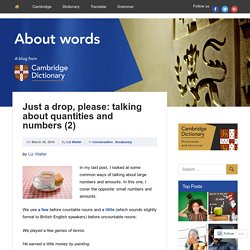
In this one, I cover the opposite: small numbers and amounts. A whole bunch of stuff: talking about quantities and numbers (1) By Liz Walter We often need to talk about amounts and numbers of things, but it is easy to make mistakes with some of the words we need to use.
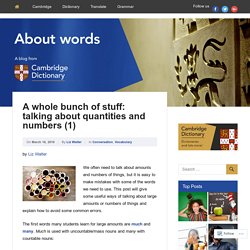
This post will give some useful ways of talking about large amounts or numbers of things and explain how to avoid some common errors. The first words many students learn for large amounts are much and many. Quantifiers Quiz. Quantifiers are words that modify nouns.

We use them to give more information about nouns; they tell us the amount or quantity of a noun. To understand which quanifier to use, you need to know countable and uncountable nouns. Predeterminer Definition and Examples in English grammar. N grammar, a type of determiner that precedes other determiners in a noun phrase.
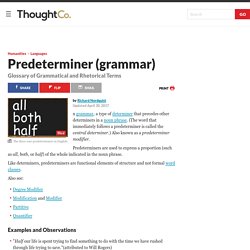
(The word that immediately follows a predeterminer is called the central determiner.) Also known as a predeterminer modifier. Predeterminers are used to express a proportion (such as all, both, or half) of the whole indicated in the noun phrase. Like determiners, predeterminers are functional elements of structure and not formal word classes. Pre-determiners. Pre-determiners are words placed before English determiners in a sentence.
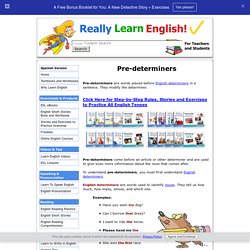
They modify the determiner. Click Here for Step-by-Step Rules, Stories and Exercises to Practice All English Tenses Pre-determiners come before an article or other determiner and are used to give even more information about the noun that comes after. To understand pre-determiners, you must first understand English determiners. English determiners are words used to identify nouns. Examples:Have you seen my dog? I want to ride the horse.Please hand me the otherpencil.She won the first race.Colorado's mountains are beautiful! Pre-determiners come before determiners. Pre-determiners can be classified into four types as shown in the chart below.
Multipliers Multipliers include words and phrases such as: Pre-determiners. Pre-determiners. Predeterminer Definition and Examples in English grammar. Noun phrases with several determiners. Learning English Grammar. How to Express Quantity in English for Beginners. There are many expressions used to express quantities and amounts in English.
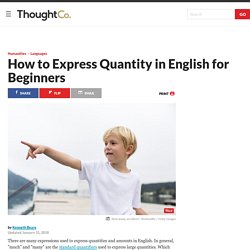
In general, "much" and "many" are the standard quantifiers used to express large quantities. Which expression you use will often depend on whether the noun is countable or uncountable and whether the sentence is negative or position. While "much" and "many" are among the most common, the following expressions are often used in place of "much" and "many," especially in positive sentences:
Expressions of Quantity for ESL Classes. Quantifiers - much, many, some, any, few, litte - Grammar Exercises - Learning English. BBC Learning English - Course: intermediate / Unit 13 / Session 1 / Activity 3. BBC Learning English - Course: intermediate / Unit 3 / Session 2 / Activity 3. BBC Learning English - Course: intermediate / Unit 3 / Grammar Reference. BBC Learning English - Course: intermediate / Unit 3 / Session 2 / Activity 1. Quantity: both, (n)either, all, most,each, every, none.
How to Use The - Articles in English Grammar. Both, either, neither. Quantity: both, (n)either, all, most,each, every, none. BBC Learning English - Course: intermediate / Unit 3 / Grammar Reference. BBC Learning English - Course: intermediate / Unit 3. Countable & Uncountable nouns 1. Countable & Uncountable nouns (1) Nouns can be countable or uncountable.
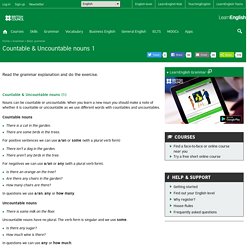
When you learn a new noun you should make a note of whether it is countable or uncountable as we use different words with countables and uncountables. Countable nouns There is a cat in the garden. There are some birds in the trees. Exercise 1. Exercise 1 - some, any, much, many, a lot of, a little, a few. Learning English Grammar. Half can be used with countable nouns and with uncountable nouns.Half the time I didn’t understand what was going on.Half the students came from overseas.Double is used with uncountable nouns.We’re going to need double the present supply of water.They want double the money they originally asked for.Both is used to define two things represented by a plural countable noun.Both men were given another chance.Both dogs had to be put down.See Determiners for more information about quantifiers when they are used with other determiners.The following quantifiers are used to express graded amounts of an item (e.g. whether there is more or less of something).Have you seen many tourists in town?
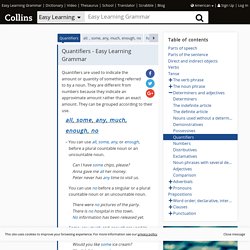
Exercise 2 - some, any, much, many, a lot of, a little, a few. Compounds: 'some / any / no / every' Unit 3 Exercise 1 - some, any, much, many, a lot of, a little, a few. Some, any, much, many. Exercise 2 - Indefinite pronouns: some-, any-, no-, every- BBC Learning English - Course: English In A Minute / Unit 1 / Session 20 / Activity 1. Commonly Confused Words: Nobody, None, and No One. The indefinite pronouns nobody (one word) and no one (two words) have the same meaning: no person or not anyone.
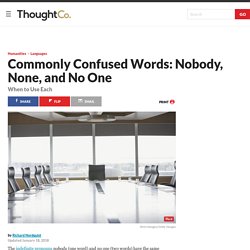
. * Lesson B superlatives (1) Lesson C quantifiers, too, not enough (2) Lesson C quantifiers, too, not enough (1)
Too. Learning English. Zero Relative Pronouns or Bare Relatives in Grammar. In English grammar, a zero relative pronoun is the missing element at the beginning of a relative clause in which the relative pronoun has been omitted. Also called a bare relative, zero relativizer, or empty operator. In standard English, the zero relative pronoun can't serve as the subject of the main verb in the clause. Relative clauses headed by zeros (represented as Ø in the examples below) are sometimes called contact clauses or contact relatives. Examples and Observations The house Ø I bought last year had sustained some fire damage. Purdue OWL Writing Exercises. In the following sentences, substitute one of these expressions for the underlined words: * little * quite a little or quite a bit of * few * quite a few To clarify, little means "not much," but quite a little (or quite a bit of) means "a rather large amount.
" Few means "not many," but quite a few means "a rather large number. " 1. Count and Noncount Nouns. Summary: This handout discusses the differences between count nouns and noncount nouns. Count nouns can be pluralized; noncount nouns cannot. Count and Noncount Nouns. Learning English. Expressions of Quantity Quiz. 1. How _____ money do you have left? CorrectWrong The noun 'money' is uncountable in English and takes the question 'How much'. 2.
There aren't _____ oranges on the table. Use 'many' for countable objects in English in the negative to mean that there are only a few. 3. Expressing Quantity - How to Express Quantity in English for Beginners. Quantifiers. We use quantifiers when we want to give someone information about the number of something: how much or how many. Sometimes we use a quantifier in the place of a determiner: Most children start school at the age of five. We ate some bread and butter.
We saw lots of birds. We use these quantifiers with both count and uncount nouns: and some more colloquial forms: Quantifiers - 01. Don't give me __________ noodles; I'm not very hungry. plenty too many too muchI've got ____________ to do today. much work a lot of work many worksBring a hundred dollars for the school trip - that should be ___________. Expressions of Quantity Quiz. Expressions of Quantity for ESL Classes.
Much, many, some, any: grammar exercise. Quantifiers - 01. Expressions of Quantity for ESL Classes. Countable and Uncountable Nouns. Expressions of Quantity Quiz. Quantifiers: Fill in the gaps. Expressions of Quantity for ESL Classes. Quantifiers: Fill in the gaps. Quantifiers: A Basic Quiz. BBC World Service. Communicative Activity Hi BegIntermediate Quantifiers. Communicative Activity Hi BegIntermediate Quantifiers. None Were vs. None Was. Rule: The word none is versatile. It has a plural sense (“not any”) as well as a singular sense (“not a single one”). When none is followed by of, look at the noun in your of phrase (object of the preposition). If the object of the preposition is singular, use a singular verb. If the object of the preposition is plural, there is more leeway.
Most of the time, but not always, you will want to use a plural verb. Examples:None of the pie was eaten. In a sentence like “None were missing,” there is an implicit noun that answers the question, “None of what?” Examples:None was missing. Note: Apparently, the SAT testing service considers none as a singular word only. Pop Quiz None of the garbage was/were picked up.None of the chairs was/were comfortable.She inspected all of the plates and none was/were chipped. Pop Quiz Answers None of the garbage was picked up.None of the chairs were or was comfortable.She inspected all of the plates and none were or was chipped. Purdue OWL. BBC Learning English - Course: intermediate / Unit 16 / Session 2 / Activity 1.